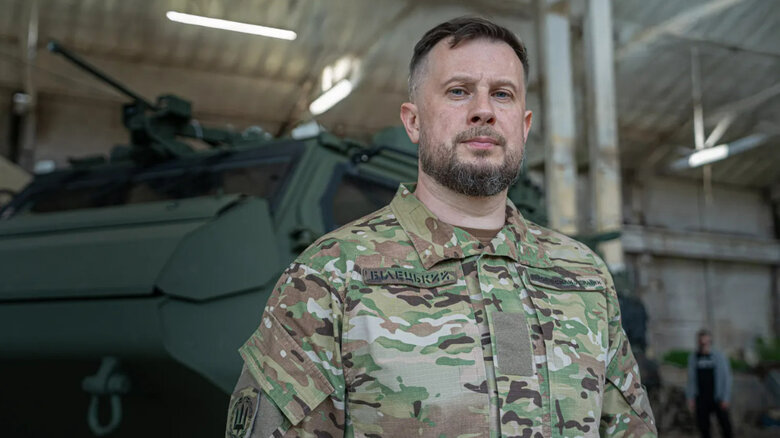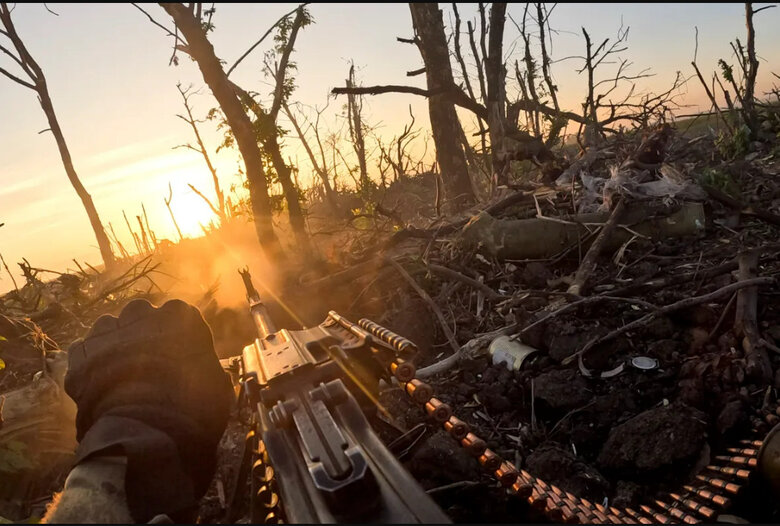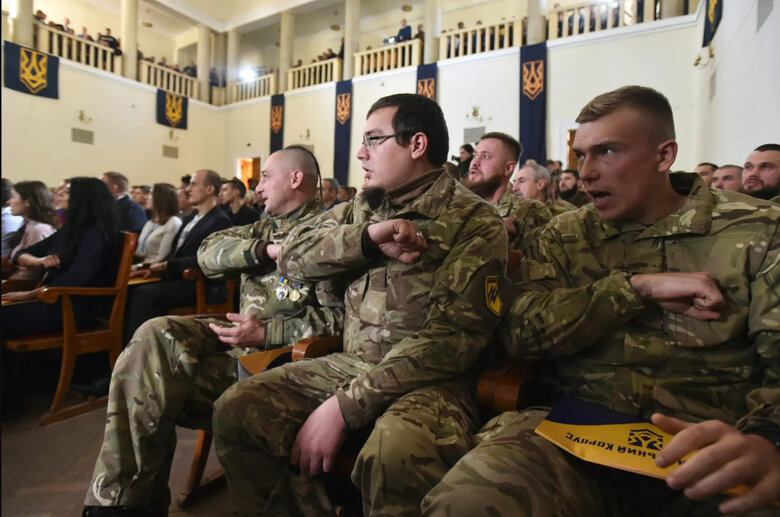Putin fears him — 20,000 Ukrainians want to fight for him
The new commander of Ukraine’s 3rd Army Corps has broad shoulders and a thick skin.
Colonel Andrii Biletsky, 46, remains a controversial figure because he led a battalion whose members were supporters of white supremacy.
ANTON SHTUKA FOR THE TIMES
Hated and feared by President Putin as the face of Ukrainian nationalism, Colonel Andriy Biletsky, 46, has survived attempts to end his life and allegations of neo-Nazism that would end most careers. Yet he now bears responsibility for the lives of 20,000 soldiers, having risen to command despite having no formal military education.
He has been tasked with holding more than a tenth of the front line, with five brigades he is forging into a corps motivated by a strong nationalist ideology, tells The Times in Kyiv in his first sit-down interview with an international media outlet for more than a decade. "The sector I took over is one of the two main directions of the Russian offensive," he says. "In [the Lyman area], Ukraine had been losing about 60 square kilometres per month before we arrived. We’ve managed to reduce the enemy’s advance to nearly zero."
The 3rd Assault Brigade near Andriivka, Donetsk region, August 2023. Photo by AR
Biletsky is no stranger to controversy and remains a deeply contentious figure within Ukraine, though he is widely considered one of the country’s most effective military commanders. He first learnt to scrap with pro-Russian demonstrators on the streets of his home town, Kharkiv, 30 km from the Russian border, and furthered his fighting skills during a resulting spell in prison as the head of the nationalist group "Patriot of Ukraine".
In 2014, when Russia annexed Crimea and launched a hybrid invasion of the Donbas, he founded and commanded the Azov Battalion, which quickly became a target for Russian propaganda due to both its battlefield effectiveness and its embrace of openly white supremacist members. That year he was elected as an independent MP on a far-right platform. Biletsky himself has been accused of writing an antisemitic commentary in 200, a charge he fiercely denies.Today, however, he presents himself as a reformed character. "It was actually a Russian fabrication," he says of the claims levelled against him in 200. "I can say unequivocally that I’m not an antisemite. In my brigade, we have Jewish people, including Israeli citizens. We have company commanders, platoon leaders, medical officers who are Jewish."
In a marked shift from the rhetoric of his firebrand youth, where he rallied with speakers condemning gay people and migrants, he says he is now "mostly" prepared to protect their rights so his country can integrate more closely with Europe. "Strangely enough, we are now defending the rights of these people far more than if the Russians had come."
The turning point for Biletsky’s rehabilitation came in 2023 when, after the capture of much of Azov’s leadership during the siege of Azovstal, he formed the rd Assault Brigade. It has developed almost cult-like status in popular culture.
The 3rd Army Corps is training with drones and close combat at a centre in Kyiv
ANTON SHTUKA FOR THE TIMES
ANTON SHTUKA FOR THE TIMES
Biletsky’s promotion to corps commander came in May this year as Ukraine sought to reform its army from a brigade-level system to the corps system. Previously dozens of disparate brigades and smaller units were rotated in and out of regional command centres, creating confusion over their capability and co-ordination.
The corps system is intended to unite a handful of brigades under commanders permanently responsible for their welfare, giving staff officers a better understanding of each unit’s strengths and weaknesses, improving co-ordination and the sharing of intelligence and experience. Biletsky’s elevation is largely due to the effectiveness of his volunteer-only brigade, which is comprised of mostly young, many right-wing diehards. He is now distributing the rd Assault Brigade’s battle-hardened veterans across the corps, sharing experienced officers and non-commissioned officers with the four other brigades, he says.
The brigade is renowned as one of the country’s most fierce fighting units and Ukraine’s backers make a beeline to Biletsky when they are looking to donate weapons. In July, for example, Evika Silina, the Latvian prime minister, met him to hand over 42 brand new Patria armoured fighting vehicles. Britain has donated at least 2 AS90 self-propelled howitzers.
At a time when recruitment efforts are struggling and brigades are undermanned, exhausted and increasingly demoralised, his brigade is at full strength and growing. Where other units are falling back around the towns of Pokrovsk and Kostyantynivka, they are holding fast at Lyman and Izyum.
By promoting Biletsky, a former opposition MP, President Zelensky has expanded the influence of a potential rival. For Biletsky, however, any political future seems far off.
Today he is focused on the welfare of his soldiers: the quality of their food, conditions and equipment. Another key ingredient is ideology, he says. "No matter how a person ends up at war, they will face the question of their own mortality. At that point material incentives don’t matter, no one is willing to die for money," he says. "In the hardest moments, a person must identify themselves — with being a warrior, with military brotherhood, and with a mission that’s greater than themselves." Biletsky’s troops are believers.
When The Times visited their portion of the front line, soldiers at the front spoke of Biletsky in reverential tones, describing him in absentia with the patronymic, a form of his name usually reserved for politely addressing someone in person. "We have discussion clubs where people talk about things far beyond just the war — about future tech, business ideas, the country’s path forward," Biletsky explains. "They feel like warriors, but also citizens — with every right to speak and think about the future."
His men credit him with standing up to senior officers. Biletsky admits that, at times, he has come to blows with them. "Sometimes in the rd Brigade, a ‘man-to-man talk’ is considered appropriate and acceptable — but only in exceptional cases," he says. "I’ve had to talk that way with some senior officers during this war. Because I considered what they were doing to be outright betrayal toward their soldiers."
Veterans of the "Azov" regiment at a meeting of the "National Corps" political party. GENYA SAVILOV/AFP/GETTY IMAGES
There have been reports of violence sometimes being meted out as discipline for failures in combat, or in the past over political disagreements, something he denies. "There are extreme conditions, and sometimes there are extreme actions. It’s not true, I don’t hit subordinates."
In the Izyum sector, Biletsky has opened up his section of the front line to the western arms industry.
"I always tell my people: for the foreseeable future, we are not going to be at war with Britain, the United States or France. So we are completely open to working with tech companies from such countries," he says. "We give full access. Our big advantage is that we provide after-action reviews, test results, actual data from battlefield use — so people want to work with us. Obviously, that gives us access to advanced technologies."
Despite the relative successes this has allowed his own brigade, Biletsky concedes that Ukraine needs "needs negotiations soon" because of the reality on the front line. His country’s best bet, he adds, is to hold the Russians to a stalemate.
"Negotiations will only be effective when their advances drop to zero and their losses are high," he says. "Only then will they seriously sit down. Until then, any talks will just be a delay tactic until they can launch new offensives."
Even if a fragile peace were agreed, Ukraine should militarise its society along the lines of Israel, he says, with a view to retaking territory from. "Our military-industrial complex can become a serious driver of Ukraine’s economy postwar. We can’t live off donations and subsidies. Our experience and a large Ukrainian army could become a key component of European security."
"I believe we will reclaim our territory," he adds. "I’m convinced that Russia will face a time of internal turmoil. By that point, we must have a united society and a strong military force so that — like Azerbaijan in Nagorno-Karabakh — we can quickly take back what’s ours when the opportunity comes."
Biletsky’s troops, meanwhile, have attained a cultural cachet. Brigade musicians collaborate on tracks with Ukrainian rock and pop stars. Its soldiers are the focus of the forthcoming documentary 2000m to Andriivka, made by the Oscar-winning producers of 20 Days in Mariupol. Biletsky enjoyed the film, he says, despite its brutally candid portrayal of his brigade’s losses as they captured a village that was later retaken.He learnt from the mistakes he made there, he adds. "During the assault on Andriivka, we initially chose the southern direction as the key axis. That ended up dragging out the operation and led to losses that, perhaps, could have been avoided. In the end, I alone made the final decision."
Some losses hit harder than others. "It’s always hardest to lose your direct subordinates, because you feel like maybe you didn’t do everything 00 per cent right. That’s why today a guy, or several guys, were killed. It’s always difficult."
Biletsky says he has lost five close friends since the 2022 invasion, he says. "It’s different with friends — losing subordinates might be harder, but with friends, it’s about not having someone to talk to in the evening. Just calling and sharing your day. It’s a different kind of loss."
Biletsky believes Ukraine will take back the territory lost to Russia
Biletsky believes Ukraine will take back the territory lost to Russia
ANTON SHTUKA FOR THE TIMES
Biletsky says he envisages a future in the military, but his reputation as an effective leader is making him an ever more powerful political force in wartime Ukraine. He was not afraid to criticise Zelensky’s recent attempt to grab control of Ukraine’s anti-corruption bodies. "I believe this move is unjustified and inappropriate during wartime," he says.
His vision for the future, he says, involves a permanently militarised society, effectively becoming the army and the arsenal of a Europe that has proved alarmingly slow to build its own.
Yet it must be democratic rather than authoritarian, he says, in another veiled critique of Zelensky. "Maximum centralisation essentially kills everything. I feel like I do my job well, so I believe I have the right to speak honestly and call things by their names."
Author - Maxim Tucker, The Times






